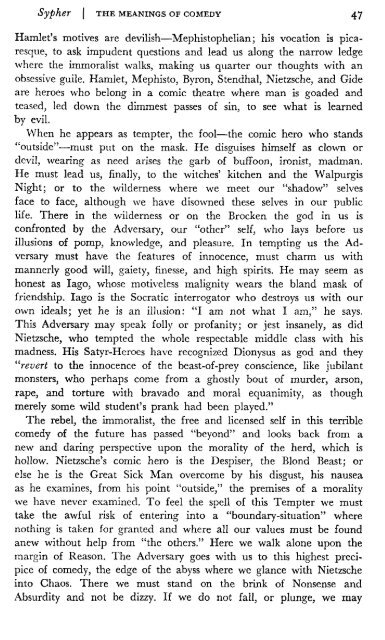The Meanings of Comedy* - Shakespeare Navigators
The Meanings of Comedy* - Shakespeare Navigators
The Meanings of Comedy* - Shakespeare Navigators
You also want an ePaper? Increase the reach of your titles
YUMPU automatically turns print PDFs into web optimized ePapers that Google loves.
Sypher I rrm MEANTNcs oF coMEDy 47<br />
Hamlet's motives are devilish-Mephistophelian; his vocation is picaresque,<br />
to ask impudent questions and lead us along the narrow ledge<br />
where the immoralist walks, making us quarter our thoughts with an<br />
obsessive guile. Hamlet, I{ephisto, Byron, Stendhal, Nietzsche, and Gide<br />
are heroes vv'ho belong in a comic theatre where man is goaded and<br />
teased, led down the dimmest passes <strong>of</strong> sin, to see what is learned<br />
by evil.<br />
lVhen he appears as tempter, the fool-the comic hero who stands<br />
"61115ids"-11ust put on the mask. He disguises himself as clown or<br />
devil, wearing as need arises the garb <strong>of</strong> buffoon, ironist, madman.<br />
He must lead us, finally, to the witches' kitchen and the Walpurgis<br />
Night; or to the wilderness where we meet our "shadow" selves<br />
face to face, although we have disorvned these selves in our public<br />
life. <strong>The</strong>re in the wilderness or on the Brocken the god in us is<br />
confronted by the Adversary our "other" self, who lays before us<br />
illusions <strong>of</strong> pomp, knowledge, and pleasure. fn tempting us the Adversary<br />
must have the features <strong>of</strong> innocence, must charm us with<br />
mannerly good will, gaiety, finesse, and high spirits. He may seem as<br />
honest as Iago, whose motiveless malignity wears the bland mask <strong>of</strong><br />
friendship. fago is the Socratic interrogator who destroys us with our<br />
own ideals; yet he is an iilusion: "f am not what I am," he says.<br />
This Adversary may speak folly or pr<strong>of</strong>anity; or jest insanely, as did<br />
Nietzsche, who tempted the whole respectable middle class with his<br />
madness. His Satyr-Heroes have recognized Dionysus as god and they<br />
"reuert to the innocence <strong>of</strong> the beast-<strong>of</strong>-prey conscience, like jubilant<br />
monsteni, who perhaps come from a ghostly bout <strong>of</strong> murder, arson,<br />
rape, and torture with bravado and moral equanimity, as though<br />
merely some wild student's prank had been played."<br />
<strong>The</strong> rebel, the immoralist, the free and licensed self in this terrible<br />
comedy <strong>of</strong> the future has passed "beyond" and looks back from a<br />
new and daring perspective upon the morality <strong>of</strong> the herd, which is<br />
hollow. Nietzsche's comic hero is the Despiser, the Blond Beast; or<br />
else he is the Great Sick Man overcome by his disgust, his nausea<br />
as he examines, from his point "outsider" the premises <strong>of</strong> a morality<br />
we have never examined. To feel the spell <strong>of</strong> this Tempter we must<br />
take the awful risk <strong>of</strong> entering into a "boundary-situation" where<br />
nothing is taken for granted and where all our values must be found<br />
anew without help from "the others." Here we walk alone upon the<br />
margin <strong>of</strong> Reason. <strong>The</strong> Adversary goes with us to this highest precipice<br />
<strong>of</strong> comedy, the edge <strong>of</strong> the abyss where we glance with Nietzsche<br />
into Chaos. <strong>The</strong>re we must stand on the brink <strong>of</strong> Nonsense and<br />
Absurdity and not be dizzy. If we do not fall, or plunge, we may


